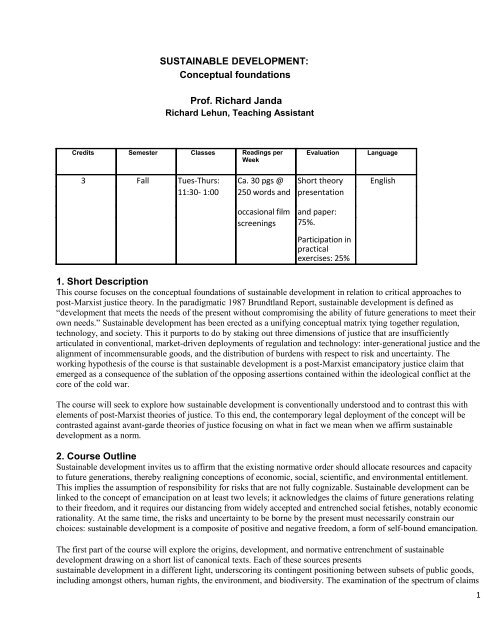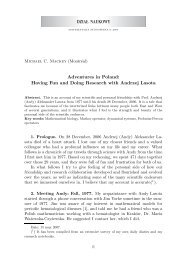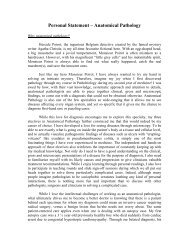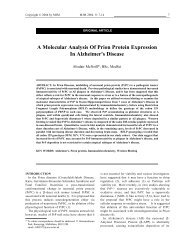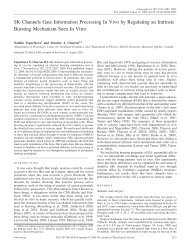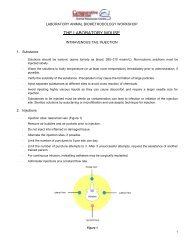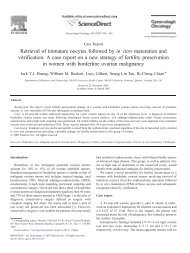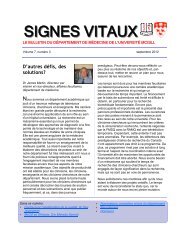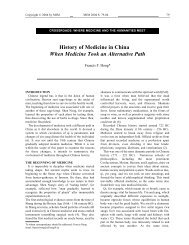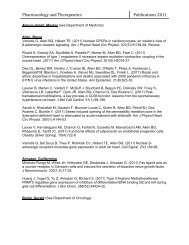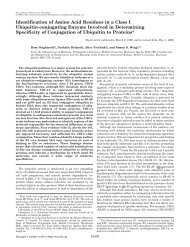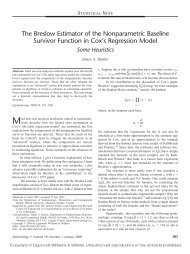Sustainable Development - Conceptual Foundations
Sustainable Development - Conceptual Foundations
Sustainable Development - Conceptual Foundations
Create successful ePaper yourself
Turn your PDF publications into a flip-book with our unique Google optimized e-Paper software.
SUSTAINABLE DEVELOPMENT:<br />
<strong>Conceptual</strong> foundations<br />
Prof. Richard Janda<br />
Richard Lehun, Teaching Assistant<br />
Credits Semester Classes Readings per<br />
Week<br />
Evaluation Language<br />
3 Fall Tues-Thurs: Ca. 30 pgs @ Short theory English<br />
14:30- 11:30- 1:00 250 words and presentation<br />
occasional film and paper:<br />
screenings 75%.<br />
Participation in<br />
practical<br />
exercises: 25%<br />
1. Short Description<br />
This course focuses on the conceptual foundations of sustainable development in relation to critical approaches to<br />
post-Marxist justice theory. In the paradigmatic 1987 Brundtland Report, sustainable development is defined as<br />
“development that meets the needs of the present without compromising the ability of future generations to meet their<br />
own needs.” <strong>Sustainable</strong> development has been erected as a unifying conceptual matrix tying together regulation,<br />
technology, and society. This it purports to do by staking out three dimensions of justice that are insufficiently<br />
articulated in conventional, market-driven deployments of regulation and technology: inter-generational justice and the<br />
alignment of incommensurable goods, and the distribution of burdens with respect to risk and uncertainty. The<br />
working hypothesis of the course is that sustainable development is a post-Marxist emancipatory justice claim that<br />
emerged as a consequence of the sublation of the opposing assertions contained within the ideological conflict at the<br />
core of the cold war.<br />
The course will seek to explore how sustainable development is conventionally understood and to contrast this with<br />
elements of post-Marxist theories of justice. To this end, the contemporary legal deployment of the concept will be<br />
contrasted against avant-garde theories of justice focusing on what in fact we mean when we affirm sustainable<br />
development as a norm.<br />
2. Course Outline<br />
<strong>Sustainable</strong> development invites us to affirm that the existing normative order should allocate resources and capacity<br />
to future generations, thereby realigning conceptions of economic, social, scientific, and environmental entitlement.<br />
This implies the assumption of responsibility for risks that are not fully cognizable. <strong>Sustainable</strong> development can be<br />
linked to the concept of emancipation on at least two levels; it acknowledges the claims of future generations relating<br />
to their freedom, and it requires our distancing from widely accepted and entrenched social fetishes, notably economic<br />
rationality. At the same time, the risks and uncertainty to be borne by the present must necessarily constrain our<br />
choices: sustainable development is a composite of positive and negative freedom, a form of self-bound emancipation.<br />
The first part of the course will explore the origins, development, and normative entrenchment of sustainable<br />
development drawing on a short list of canonical texts. Each of these sources presents<br />
sustainable development in a different light, underscoring its contingent positioning between subsets of public goods,<br />
including amongst others, human rights, the environment, and biodiversity. The examination of the spectrum of claims<br />
1
involved will necessarily touch on the related academic paradigms, such as developmental and environmental studies,<br />
economics, sociology and philosophy. Key questions addressed include:<br />
• What are the conceptual origins of sustainable development?<br />
• How are public goods understood within the existing legal archetype?<br />
• What is the overlay between conventional conceptions of justice and sustainable development?<br />
• How does the above relate to justice claims of future generations?<br />
• How have inter-claim conflicts been identified and managed up until now?<br />
We will use a leading book on international sustainable development law as well as examples of contemporary legal<br />
deployment of sustainable development norms to frame this preliminary overview of the subject. Having identified a<br />
set of problems and questions concerning the concept of sustainable development, the second part of the course<br />
focuses on a critical analysis of how sustainable development can be articulated as an emancipatory justice claim. It<br />
will do so by outlining a justice matrix consisting of four dimensions: metaphysical (that imbuing justice from without<br />
– originally the sacred), subjective (that ascribed to justice by our own lights through reason), conventional (that given<br />
to justice by society), and the emancipatory (that which is linked to nonidentical, non-affirmative epistemologies). The<br />
course will involve student explorations of aspects of this justice matrix as tested against specific examples of how the<br />
sustainable development concept is deployed to unify regulation, technology, and society. In order to perform this<br />
assessment, the course will review significant moments in the historical evolution from Marxist to post-Marxist<br />
theories of justice as well as their deficits. To begin with, the relationship between Hegel and Marx will be explored in<br />
order to define the emancipatory justice claim. This will be further refined through readings from Adorno, Derrida,<br />
Merleau-Ponty, Sloterdijk, and Žižek. Each student will be asked to take one essential theoretical question confronting<br />
sustainable development (e.g. what is inter-generational justice? how can incommensurable public goods be rendered<br />
commensurable?), and to pose it through the lens of a selection of key readings. By the end of the course we will<br />
thereby have assembled a prismatic account of the conceptual underpinnings of sustainable development as a justice<br />
claim.<br />
2
3. Concept Map<br />
4. Course Objectives<br />
i. To explore justice claims underpinning sustainable development.<br />
ii. To sketch out a theoretical and historical basis for understanding and engaging in dialogue about<br />
sustainable development and justice theory.<br />
iii. To permit the students to understand the epochal challenges confronting justice theory in the post-Marxist<br />
era.<br />
iv. To prompt students to contemplate the close relationship between justice theory and epistemology.<br />
v. To begin charting a meta-theoretical justice matrix so as to situate both the legitimacy and the shortfalls of<br />
the justice claims of sustainable development.<br />
5. Pedagogical Method<br />
i. To reduce the time and the investment necessary for students to acquire adequate conceptual knowledge by<br />
reducing the quantity of readings in order to focus on theoretical comprehension.<br />
3
ii. To structure the class around encouraging the highest degree of active participation by the students, so as<br />
to illustrate how theoretical work can involve an active dialogic process and not only a process of quiet<br />
contemplation.<br />
6. Obligatory Materials<br />
Will be made available on WebCT or distributed in class handouts<br />
7. Bibliography<br />
1. Our Common Future: Report of the World Commission on Environment and<br />
<strong>Development</strong> available at http://habitat.igc.org/open-gates/ocf-ov.htm<br />
(Excerpts)<br />
2. Marie-Claire Cordonier Segger and Ashfaq Khalfan, <strong>Sustainable</strong> <strong>Development</strong><br />
Law Principles, Practices, and Prospects (Oxford: Oxford, 2004) (Excerpts)<br />
3. “World Summit Outcome 2005”(Excerpts)<br />
4. Report of the World Summit on <strong>Sustainable</strong> <strong>Development</strong> (Excerpts)<br />
5. ILA New Delhi Declaration of Principles of International Law Relating to<br />
<strong>Sustainable</strong> <strong>Development</strong> (Excerpts)<br />
6. Immanuel Kant, Grounding for the Metaphysics of Morals (Indianapolis:<br />
Hacket, 1981) (Excerpts)<br />
7. G.W.F. Hegel, Elements of the Philosophy of Right (Cambridge: Cambridge<br />
University Press, 1991) (Excerpts)<br />
8. Karl Marx, Capital: a Critique of Political Economy (London: G. Allen &<br />
Unwin, 1929) (Excerpts)<br />
9. Vladimir Ilyich Lenin (Влади́мир Ильи́ч Улья́нов), One Step Forward, Two<br />
Steps Back (Excerpts)<br />
10. Max Horkheimer and Theodor W. Adorno, Dialectic of Enlightenment, (New<br />
York: Continuum, 1995) (Excerpts)<br />
11. Maurice Merleau-Ponty, Humanism and Terror; an essay on the Communist<br />
Problem, (Boston: Beacon Press, 1969) (Excerpts)<br />
12. Jacques Derrida, Les Spectres de Marx (Paris: Galilée, 1993) (Excerpts)<br />
13. Theodor W. Adorno, Negative Dialectic (New York: Continuum, 1987)<br />
(Excerpts)<br />
14. Peter Sloterdijk, Critique of Cynical Reason (Minneapolis: U. of Minn. Press,<br />
1987) (Excerpts)<br />
5<br />
8. Films<br />
1. The Corporation (2003) directed by Mark Achbar and Jennifer Abbott.<br />
2. Oberst Redl (1985) directed by István Szabó<br />
3. Taxi Driver (1976) directed by Martin Scorcese<br />
4. Themroc (1972) directed by Claude Faraldo<br />
5. Броненосец Потёмкин (1925) directed by Sergejs Eizenšteins<br />
6. W.R. - Misterije organizma (1971) directed by Душан Макавеев<br />
7. La Battaglia di Algeri, (1966) directed by Gillo Pontecorvo<br />
8. El Laberinto del fauno (2007) directed by Guillermo del Toro<br />
9. Rashômon (羅生門) (1950) directed by Akira Kurosawa (黒沢 明)<br />
10. Dekalog (Parts 1 and 5) (1988) directed by Krzysztof Kieślowski<br />
4
9. Professorial Contact<br />
My telephone number is: (514) 398-5097. My FAX number is: (514) 398-2498. My McGill e-mail address<br />
is: richard.janda@mcgill.ca. I would however prefer that you communicate with me via the Course Web<br />
page. This will allow me to centralize all course communication and to keep better track of the course. I have<br />
scheduled office hours for Tuesday afternoons from 14h45 through 17h00. Students should feel free to drop<br />
by without appointment during these Office Hours. If possible, I would be grateful for a brief note in<br />
advance concerning the matter you wish to discuss. Normally I should also be available to meet students for<br />
a few minutes immediately after each class. Students may arrange an appointment to see me at some other<br />
time, either by speaking to me after class, or by telephoning or sending an e-mail.<br />
10. Teaching hours and class cancellations:<br />
• Classes will be held Tuesdays and Thursdays: 11:30-1:00<br />
• Anyone missing class is requested to send me a one line email as advance notice.<br />
To receive full marks for participation students must attend 70% of classes.<br />
11. Preparation and Evaluation<br />
The course will proceed in a modified colloquium format. I will introduce a topic with the cooperation of<br />
Richard Lehun (TA). After that students will be asked to do presentations from the course materials.<br />
Presentations are to be no more than 10 pages (around 20-30 minutes) and will be focused on specific<br />
questions related to course content. The presentations can make use of PowerPoint in order to facilitate the<br />
accessibility to the main themes. The PowerPoint presentation may simply consist of significant quotes from<br />
the presentation text.<br />
Attendance at the film screenings is mandatory. Students will be expected to enter a short commentary or<br />
analysis after the screenings on WEB CT indicating how the film illuminates the issues dealt with in the<br />
week’s readings. Failure to provided commentary for at least 70% of the screenings will lead to a reduction<br />
in the grade attributed for practical exercises.<br />
The paper and PowerPoint presentation will be available for our review no later than three days before the<br />
class is to take place. Neither the text nor the presentation will be marked at this stage. If necessary, a<br />
meeting will take place at that time to suggest any changes to the text or PowerPoint presentation. The<br />
presentation will be marked on the day it is made. The paper will be marked at the end of the semester after<br />
submission in essay form. No legal footnoting is required. References can be made to the page numbers of<br />
the texts used for the course. No outside reading is required. Each presentation will be followed by a student<br />
commentator, who will have the specific task of leading the discussion on the presentation. 75% of the grade<br />
will be determined by the presentation, paper, and commentary and 25% will be determined by exercises.<br />
5


